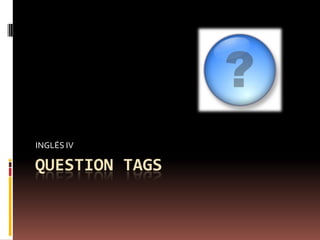
Question Tags en Inglés
- 2. 1.¿QUÉ SON LAS QUESTION TAGS? Muy sencillo. Igual que en el español las question tags son preguntas que hacemos al final de algo que dijimos para confirmar que nuestro interlocutor (la personas con la que hablamos) nos comprendió o que lo que decimos es cierto.
- 3. Por ejemplo en español decimos: ‘Hace mucho calor ¿no es así?’ ‘No pensarás ir a la fiesta sin hacer tus deberes ¿o sí? ‘Estamos viviendo tiempos de cambio ¿o no?’ ‘La cena estuvo deliciosa ¿verdad?’
- 4. En inglés no es muy diferente pero es muy importante tener en cuenta unas cuantas reglas. ¿Estás listo?
- 5. 2. REGLAS PARA LAS QUESTION TAGS Antes de explicar los casos particulares es básico que aprendas estas tres reglas: 1. Los question tags utilizan siempre los verbos auxiliares. 2.Con oraciones afirmativas utilizamos un question tag en NEGATIVO. 3. Con oraciones negativas utilizamos un question tag en AFIRMATIVO.
- 6. 2.1 ORACIONES AFIRMATIVAS CON EL VERBO TO BE EN PRESENT SIMPLE O CONTINUO. It's a beautiful day, isn't it? (Es un día hermoso, ¿no?) Martha is angry, isn't she? (Marta está enojada, ¿verdad?) You are really tired, aren't you? (Estás muy cansado, ¿no?) They're very nice people, aren't they? (Son personas muy agradables, ¿no?) I am in time. Am not I? (Estoy a tiempo ¿no es así?) I’m in fourth semester. Am not I? (Estoy en cuarto semestre ¿o no?) Primero observa el verbo ‘to be’ en sus diferentes formas de afirmativo (am,is,are,’m,’s,’re). Observa cómo después de la coma usamos la forma negativa del verbo tobe. Si te das cuenta al hacer la pregunta, primero ponemos el verbo to be y luego el pronombre (I,you,he,she,it, etc.)
- 7. MÁS EJEMPLOS You are his sister, aren’t you? I am your friend, am not I? They are in Mexico, aren´t they? She is Martha, isn’t she? Luis is 23 years old, isn’t he?
- 8. 2.2 ORACIONES NEGATIVAS CON EL VERBO TO BE EN PRESENT SIMPLE O CONTINUO. I'm not late, am I? (No llego tarde, ¿o sí?) It isn't a beautiful day, is it? (No es un día hermoso, ¿verdad?) Martha isn't angry, is she? (Marta no está enojada, ¿no?) You aren't really tired, are you? (No estás muy cansado, ¿verdad?) Como te darás cuenta, es lo mismo que lo anterior pero al revés, es decir, comienzas con una oración negativa y haces el tag question al final.
- 9. MÁS EJEMPLOS You aren’t serious, are you? Elsa isn’t Mexican, is she? Marcus and Nora aren’t students, are they? I am not an architect, am I? We aren’t in Australia, are we?
- 10. 2.3 ORACIONES AFIRMATIVAS CON EL VERBO TO BE EN PAST SIMPLE O CONTINUO. It was a beautiful day, wasn't it? (Fue un día hermoso, ¿verdad?) Martha was angry, wasn't she? (Marta estaba enojada, ¿no?) You were really tired, weren't you? (Estabas muy cansado, ¿verdad?) Como habrás observado, lo único que cambia en estos ejemplos es el verbo to be ya que ahora está en pasado.
- 11. MÁS EJEMPLOS Julian was a student, wasn’t he? Sarah and Jimmy were here, weren’t they? We were in a party yesterday, weren’t we?
- 12. 2.4 ORACIONES NEGATIVAS CON EL VERBO TO BE EN PAST SIMPLE O CONTINUO. It wasn't a beautiful day, was it? (No fue un día hermoso, ¿no?) Martha wasn't angry, was she? (Marta no estaba enojada, ¿no?) You weren't really tired, were you? (No estabas muy cansado, ¿verdad?) Como te habrás dado cuenta, es lo mismo que lo anterior, pero al revés, es decir, de negativo cambiaron a positivo.
- 13. 2.5 ORACIONES AFIRMATIVAS CON OTROS VERBOS COMUNES. Elena has traveled a lot, hasn't she? (Elena ha viajado mucho, ¿no?) Ann will be here soon, won't she? (Ana estará pronto aquí, ¿verdad?) Tom should pass his exam, shouldn't he? (Tom debería aprobar su examen, ¿no?) Cuando usamos otros verbos seguimos estas reglas de afirmativo a negativo y al revés: Has: hasn’t/ have:haven’t Should:shouldn’t Will:won’t Must: mustn’t
- 14. Cuando usamos otros verbos como: run,eat,live,decide, y muchos otros verbos de acción usamos don’t(I,you,we,they) o doesn’t (he,she,it)si el verbo está en presente o didn’t si está en pasado. Ejemplos: They live in America, don´t they? Miriam likes pizza, doesn’t she? I don’t run in the park all mornings, do I? We lived in Canada last year, didn’t we? Sarah doesn’t believe in Christmas, does she?
- 15. 2.6 IMPERATIVOS O INVITACIONES Cuando damos una orden (imperativo), usamos el auxiliar will: Open the door, will you? Pass me the salt, will you? Al dar una sugerencia (let’s), usamos el auxiliar shall: Let’s go to the beach, shall we? Let’s not sleep too late, shall we?